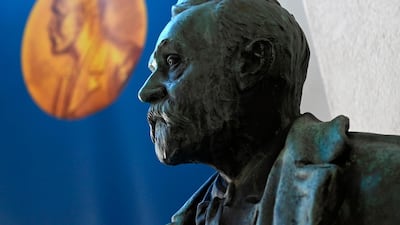The name Alfred Nobel is synonymous with the annual awards to which he bequeathed most of his fortune but the chemist and businessman was once better known for inventing dynamite.
Mr Nobel, born in 1833 into a family of accomplished Swedish scientists, made his wealth producing a stable and commercially viable form of nitro-glycerine: dynamite.
Over a series of experiments lasting more than 15 years, the chemist perfected the destructive substance even though it cost him his brother in the process - Emil Nobel was killed in a blast during the tests.
Dynamite changed the world. Alfred Nobel said he had intended to invent a safe form of explosive powder and had never envisaged its use in warfare. However, within years his creation had revolutionised military technology.
Invented in 1867, dynamite was first used as a weapon in the Franco-Prussian War in 1870 and went on to play a significant role on the battlefield.

While the substance allowed huge advances particularly in mining, it was also applied to weaponry such as guns, and was used widely in various munitions.
Mr Nobel, who always claimed he was a pacifist, was stricken by his conscience and the deaths of so many due to his creation. He had even said he hoped dynamite might bring an end to war.
He is believed to have conceived of the Nobel prizes as a way of atoning for the impact of dynamite after amassing his fortune owning a number of munitions plants and patents.
The 19th century businessman is reputed to have been particularly struck by his infamy when reading an obituary published by mistake in a French newspaper, in which he was labelled a “merchant of death”.
Mr Nobel ordered in his will - contested by relatives - that most of his estate of 31 million Swedish crowns ($3.465m) be invested in safe securities, and the income used to fund prizes for people “who, during the preceding year, shall have conferred the greatest benefit on mankind”.
He stipulated five categories for prizes: physics, chemistry, medicine or physiology, literature and peace. A sixth, the Riksbank Prize in Economic Sciences in Memory of Alfred Nobel, was established in 1968.

